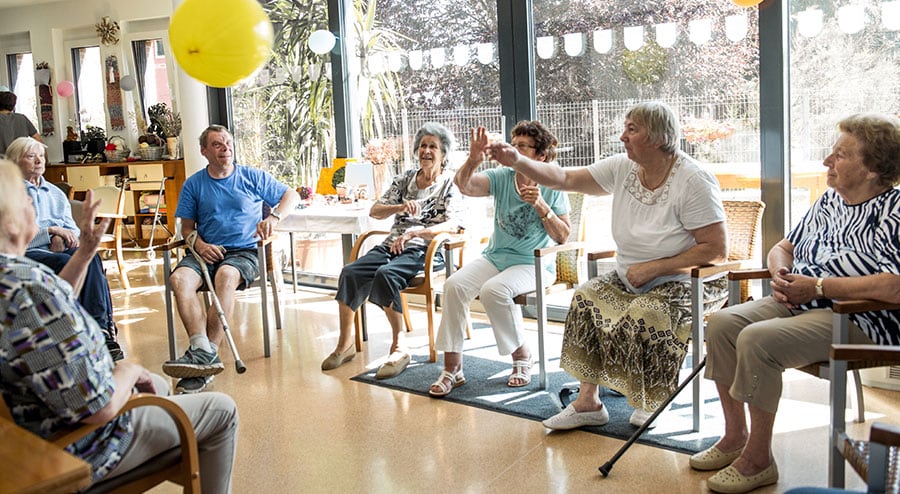Experience high-quality Assisted Living services for seniors.
Experience high-quality Assisted Living services for seniors.
Blog Article
Exploring Memory Care Options in Assisted Living Communities for Improved Wellness
The expedition of memory care choices within assisted living communities stands for a crucial action in boosting the well-being of individuals encountering cognitive difficulties. These specialized setups are designed to attend to the special requirements of locals, offering not only security and framework however additionally interesting tasks that promote social communication and cognitive excitement. As households seek the most effective feasible treatment for their liked ones, recognizing the crucial features and advantages of these areas comes to be critical. What certain factors should be taken into consideration to make sure that the chosen environment really cultivates self-respect and psychological assistance?

Comprehending Memory Treatment
(Dementia Care Charlotte)As individuals age, many face cognitive obstacles that call for customized assistance, making understanding memory care vital for families seeking ideal living plans. Memory care particularly caters to individuals with mental deterioration, Alzheimer's illness, and other memory-related problems, supplying a structured setting that promotes safety and security and well-being.
This specialized treatment is made to sustain homeowners in maintaining their freedom while resolving their distinct cognitive demands. Memory treatment facilities typically utilize trained personnel experienced in managing the intricacies of memory impairments, ensuring that residents get personalized attention and treatment. These specialists are furnished to manage behavioral issues and can provide emotional assistance to both homeowners and their family members.
Along with expert personnel, memory treatment settings are frequently outfitted with healing programs that motivate cognitive interaction, social interaction, and physical activity. These programs aim to improve the lifestyle for individuals encountering memory obstacles while fostering a feeling of area.
Understanding memory treatment is vital for family members, as it informs their decisions relating to appropriate living plans. By identifying the certain needs of their loved ones, families can make informed choices that focus on both safety and psychological well-being in a supportive setting.
Trick Attributes of Memory Care
Numerous essential attributes distinguish memory treatment facilities from basic assisted living communities, guaranteeing that locals receive the customized assistance they require. Memory treatment environments are developed to be secure and protected, minimizing the threat of straying and disorientation - Assisted Living. This consists of functions such as encased exterior areas and controlled gain access to factors

Additionally, memory care programs frequently integrate structured regimens, which can enhance cognitive feature and supply a sense of security for homeowners. Tasks are especially made to involve memory and cognitive skills, commonly consisting of memory treatment and arts and crafts customized to individual preferences.
In addition, memory care centers generally supply individualized treatment strategies that attend to the particular requirements and choices of each homeowner, ensuring that care is both personalized and effective. These attributes function jointly to produce an environment conducive to advertising the dignity and wellness of individuals reference coping with memory problems.
Advantages of Specialized Support
Specialized support in memory care facilities offers countless advantages that considerably enhance the quality of life for locals (Assisted Living). One of the main advantages is the customized technique to care, which attends to the unique needs of individuals with memory impairments. Educated personnel members are equipped with the abilities and expertise to take care of the obstacles related to conditions such as Alzheimer's disease and various other types of mental deterioration, ensuring that locals obtain proper interventions and assistance
Furthermore, customized assistance promotes a sense of security and safety. Citizens are monitored in settings designed to reduce confusion and stress and anxiety, which can exacerbate memory-related concerns. This supportive ambience not just assists in maintaining daily regimens but also promotes emotional security.
In addition, specialized support encourages social communication amongst homeowners, which can minimize feelings of isolation and solitude. By developing an area where people recognize and relate to each various other's experiences, these centers help build significant connections.
(Dementia Care Charlotte)Eventually, the benefits of customized support extend beyond physical care; they add to improved psychological and psychological wellbeing, enabling citizens to keep dignity and a better of life throughout their remain in memory treatment facilities.
Engaging Activities for Citizens
Engaging tasks play a crucial function in the general wellbeing of citizens in memory treatment communities. These tasks not only promote cognitive function yet also foster social communication, emotional expression, and a feeling of objective. Tailored programming that considers specific choices and capacities is essential for maximizing involvement and enjoyment.
Innovative arts, such as paint or songs treatment, allow homeowners to express themselves while enhancing cognitive skills. Likewise, physical tasks, including mild exercises or dancing, contribute to physical wellness and movement, which are vital for maintaining self-reliance. Furthermore, memory treatment, which includes discussing past experiences, can stimulate positive memories and reinforce connections among homeowners.
Social video games and group tasks, such as card video games or gardening, encourage teamwork and communication, providing opportunities for residents to build partnerships. Structured routines that incorporate these tasks can assist decrease stress and anxiety and behavior issues usual in people with memory problems.
Inevitably, the execution of interesting tasks customized to the special demands of residents not only boosts quality of life but also boosts the overall environment of memory care neighborhoods, developing a nurturing and helpful atmosphere.
Selecting the Right Area
Choosing the appropriate memory care community is a substantial choice that can profoundly influence the lifestyle for both locals and their families. When evaluating prospective neighborhoods, it is vital to consider a number of important factors that line up with the certain needs of the individual.
First, evaluate the center's staff-to-resident ratio and the certifications of the caretakers. Well-trained team that recognize the complexities of memory-related problems are essential for offering efficient treatment. In addition, ask about the area's strategy to customized treatment strategies, as individualized interest can significantly improve a resident's health and wellbeing.
Following, examine the environment itself. A safe, welcoming ambience with acquainted home furnishings and sensory elements can help in reducing anxiety and advertise comfort. Try to find areas that provide engaging tasks tailored to locals' interests and cognitive capacities, as these can cultivate social communication and cognitive stimulation.
Last but not least, consider the area's plans on family participation. Normal communication and chances for family involvement in treatment can strengthen connections and provide emotional support. By extensively researching and seeing prospective memory care neighborhoods, families can make an informed decision that prioritizes the well-being of their loved ones.
Conclusion
To conclude, exploring memory care options within assisted living neighborhoods presents a vital chance to boost the well-being of people with dementia and related conditions. The mix of customized support, structured regimens, and appealing activities promotes an environment conducive to cognitive stimulation and social interaction. By carefully assessing neighborhood sources and personnel credentials, households can make sure that their enjoyed ones obtain the dignity, psychological assistance, and high quality of life they are entitled to in these dedicated care setups.
Report this page